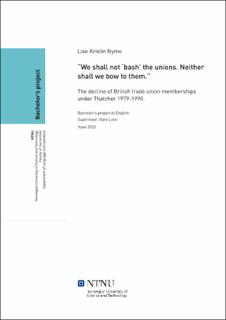| dc.contributor.advisor | Love, Gary. | |
| dc.contributor.author | Nymo, Lise Kristin. | |
| dc.date.accessioned | 2020-07-28T16:00:48Z | |
| dc.date.available | 2020-07-28T16:00:48Z | |
| dc.date.issued | 2020 | |
| dc.identifier.uri | https://hdl.handle.net/11250/2670356 | |
| dc.description.abstract | Fra Thatcher kom til makten i 1979 til hennes fall i 1990 skjedde det et drastisk fall i antallet fagforeningsmedlemmer i Storbritannia. Denne oppgaven ønsker å besvare problemstillingen: Hvorfor falt fagforeningsmedlemskapene drastisk etter 1979? Det finnes flere faktorer som bidro til denne nedgangen, blant annet økonomiske, sosiale og strukturelle endringer. Jeg vil i denne oppgaven fokusere på politiske faktorer, da disse påvirket de fleste andre faktorene også. Gjennom lovgivning og politiske krefter svekket Thatcher-regjeringene fagforeningenes politiske og sosiale stryke, samt endret de konteksten fagforeningene eksistere i, gjennom økonomisk og sosial politikk. Fagforeningene hadde dermed ikke samme forutsetninger etter Thatchers fall i 1990 som de hadde hatt før 1979. Denne oppgaven vil se på fire av de viktigste lovene Thatcher-regjeringene innførte, nemlig Employment Act fra 1980 og Employment Act fra 1982, Trade Union Act fra 1984 og en siste Employment Act fra 1988. Alle disse var med på å svekke fagforeningene, gjennom å fjerne rettigheter, endre rettslige forutsetninger og å styrke rettigheter for arbeidstakere som ikke var med i fagforeninger. Denne oppgaven ser også på hvordan fagforeningsledere og Labour-parti politikere reagerte på disse lovene. Oppgaven går gjennom tre av de viktigste streikene på 1980tallet, Stålarbeidersteiken i 1980, Kullarbeiderstreiken som varte fra 1984-1985 og Wapping-konflikten i 1986. Vi kan tydelig se at disse partene ønsket å fjerne disse lovene, og mange mente de gikk altfor langt. Thatcher-regjeringene svekket fagforeningene voldsomt på 1980tallet. | |
| dc.description.abstract | From Thatcher came to power in 1979 until her fall in 1990 there was a drastic fall in the number of trade union members in Britain. This thesis wishes to answer the question: Why did trade union membership drastically decline after 1979? There are several factors that contributed to this decline, including economic, social, and structural changes. In this thesis I will be focusing on political factors, as these are affected most other factors. Through legislation and political forces, the Thatcher governments weakened the trade unions political and social power, while changing the context the trade unions existed in through economic and social policies. The trade unions thus did not exist in the same context after Thatcher fell in 1990 as they had before 1979. This thesis will look at four of the most important pieces of legislation the Thatcher governments implemented, namely the Employment Acts from 1980 and 1982, the Trade Union Act from 1984 and the Employment Act from 1988. All these Acts helped weaken the trade unions through removing rights and changing the legal context for trade unions, as well as strengthening the rights of workers who were not unionised. This thesis also looks at how trade union leader and Labour-party leaders reacted to these Acts. I go through three of the most important strikes in the 1980s, the Steel workers’ strike in 1980, the coal miners’ strike from 1984-1985 and the Wapping dispute in 1986. We can see that these parties wanted to remove and fight the laws the Conservative governments had put in place, and many thought the legislation was too drastic. The Thatcher governments weakened the British trade unions profusely in the 1980s. | |
| dc.publisher | NTNU | |
| dc.title | “We shall not ‘bash’ the unions. Neither shall we bow to them.” – The decline of British trade union memberships under Thatcher 1979-1990. | |
| dc.type | Bachelor thesis | |
